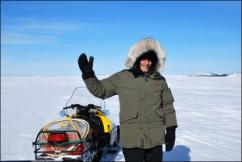Mario Blaser
 Associate Professor, Dept. of Geography
Associate Professor, Dept. of Geography
Canada Research Chair in Aboriginal Studies
Bruneau Centre, Room 2003
Memorial University of Newfoundland
Phone: (709) 864-6116
Email: mblaser[at]mun[dot]ca
Research Interests
Currently my research interests can be summarized with the title of my graduate course: When Worlds Meet. What I am trying to work through is the idea that 'moderns' have a very particular way of producing the world they live in, one that is profoundly marked by the nature/culture divide. This is a very basic, ontological, assumption about how reality is constituted that express itself in a variety of ways: from the way in which we conceive what constitutes accurate knowledge to the way in which we conceive politics. I look at this problematic through the various relations between modern institutions (from science to government) and the world that emerge from Aboriginal peoples' experiences and practices. The guiding insight here is that in many Aboriginal peoples' experiences and practices we can see examples of the World Social Forum's slogan, "Another World is Possible." In this sense, working with and learning from Aboriginal traditions opens up an avenue to address in unsuspected ways the challenges that we are facing nowadays from increasing inequality to the environmental crises. At the same time I am very concerned with not being misinterpreted as a 'romantic' that offers an idealized example of Aboriginal peoples as the panacea to all the problems. Rather the point is to rescue from imposed invisibility the idea that there are other ways of existing that are viable while at the same time showing how those ways of existing struggle hard in the face of an encroaching modernity that cannot tolerate anything that differs from itself.
Some of the topics through which I address this general problematic include:
- The practices and politics of caring for non-humans
- Notions of a good life, from development to "Buen Vivir" (Living well)
- Natural resources vs. sentient landscapes
- Regional focus: Labrador and Latin America